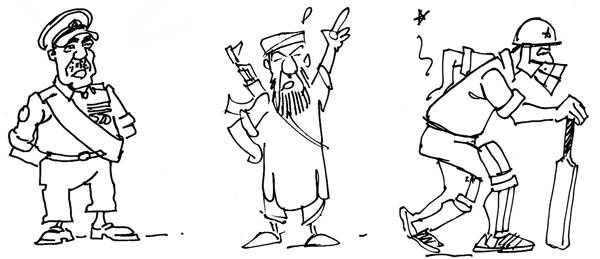
Crux of the matter

Sir,
Since the beginning of peace talks with the Taliban, a new wave of terror has been unleashed in the already terrorized country. But our political leaders continue to live in denial.
Extremist forces are employing anarchist tactics to cow the masses down. The implementation of faith-based laws in a country with diverse beliefs and cultures may result in communal and political troubles.
How much these talks can change the lives of Pakistanis is a big question. It seems that the crux of the matter is that the establishment’s stance matters more than the civil government’s initiatives. It seems that civil and military leaders see the situation through different lenses. Civil governments have always had a different direction on foreign policy than the establishment.
It seems that in the current security situation, civil-military relations are an independent variable. Any endeavor overlooking them will not bear fruit.
Atif Mahmood Majoka,
Melbourne.
Constitution conundrum
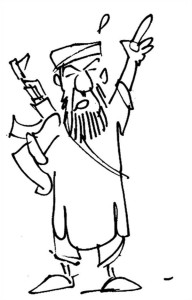
Sir,
The recent talks between the Pakistani government and the Tehrik-e-Taliban Pakistan (TTP) have ignited a discussion regarding the Islamic legitimacy of the constitution of Pakistan. With the TTP claiming at the start of the talks that the constitution is not Islamic and the government asserting the opposite, many debates have been spawned across talk shows and livings rooms. Whilst the current discussion is framed within the context of bringing an end to the violence plaguing Pakistan since America arrived in the region post 9/11, the topic is of interest not just to the parties involved in the talks but to those who have a genuine concern for the Islamic nature of the country.
The chief defence of the constitution’s Islamic credentials is that it cites Islam as the state religion and has provisioned for the Federal Shariat Court (FSC) to examine whether all laws that are passed are in accordance with Islam.
This logic implicitly assumes that the process of developing laws within the democratic framework as afforded by the constitution is near identical to that of extracting laws from Islamic texts in the process of jurisprudence, with a little something on top to ‘Islamicise’ the democratic process. Yet the reality of both procedures contrasts starkly.
In a democratic process, law makers who are elected by the people come together to develop laws as they see fit. There are no constraints as to what they can legislate for, with only a majority of some sorts being required to pass any particular law. There is no requirement for the legislators to have previous legal experience nor that they be experts on the subject matter at hand, though technical advice can be sought if required.
In Islam many matters are clearly defined as being legal or illegal, such as the consumption of alcohol, adultery and interest based transactions. In areas where definitive rulings do not exist or for new realities encountered, a legal expert is required to extract a ruling from Islamic texts. If the legal expert does not possess technical expertise in understanding a particular subject matter then he or she is allowed to call upon the help of specialists to apprise them of the reality eg a doctor to explain the technical aspects of the human cloning process. This process is known as Ijtihad.
In a situation where a numerous legal experts have extracted an array of opinions on the same matter based upon either a variation of their understanding of the technical reality, or use of different principles in accessing non-definitive Islamic texts, it is then up to the ruler of the State to adopt one opinion for it to become the sole reference point in law.
The problem therefore is apparent in the Pakistani law making process; legislative chambers which are filled with individuals unqualified to extract laws from Islamic sources from a jurisprudential perspective are enacting laws for the country to follow simply according their own limited knowledge and experience rather than turning to divinely revealed guidance.
Further, the powers of the executive are ill defined between the President and the Prime Minister which according to Islam should be vested in a single ruler and thus enable him to adopt laws extracted according to Islamic texts. This is crucial as under the current democratic system even if both legislative chambers of the National Assembly and Senate were filled with qualified jurists the mechanism to enact an extracted legal opinion in to law would be missing, leading to confusion and potential conflict.
Additionally, political parties enact laws upon the basis of populism, pragmatism and imitation of the West rather than looking to Islam for solutions. The political context of law making cannot be ignored, as laws are made by the corrupt to serve their own personal interests, without the restrictions which divine Islamic texts would impose, as well as to serve the economic, military and political agenda of foreign colonial powers. This political backdrop combined with conceptual deficiencies within the constitution has created a secular state in Pakistan which goes against the beliefs of the people and their desire to live by Islam. A cursory look at some key areas of governance reveal how different Pakistan is to what an Islamic state should be.
Muhammad Asim,
Islamabad.
Wasteful ways
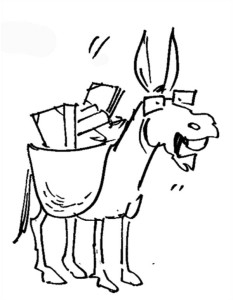
Sir,
Frivolous duplication of facilities should always be resisted – more so when funding is scarce. This truism, however, isn’t the operating principle of the Higher Education Commission (HEC) and the Pakistan Engineering Council (PEC). The PEC is one of 12 bodies the HEC uses to accredit programs in our universities.
I work on a small university campus the length of which can be covered on foot in less than 10 minutes. This makes every building easily accessible. The currently adequate library and reading areas on campus provide sufficient space for all. Soon it will move to a space three times its current area. This is made known to all visiting representatives of the HEC and the PEC.
Despite this, the PEC when accrediting two programs in the university demanded that the two departments hosting these programs set up independent departmental libraries. This has been done at considerable cost, waste of space, and the mere duplication of textbooks that are available in the main library. A HEC team meant to approve a PhD in English program has asked that yet another departmental library be set up.
Further, the PEC demanded that the university subscribe to paper copies of some research journals at high cost. This was done despite knowing that these very journals are available electronically on campus via the HEC’s own digital library.
Ideally, universities should be strong enough to resist such inane orders from above. Worse, the HEC remains unmoved despite being informed by the university of such pointless expenditure. Surely the misuse of funds must stop and the highlighted errors corrected in all universities.
Q Isa Daudpota,
Islamabad.
Googly
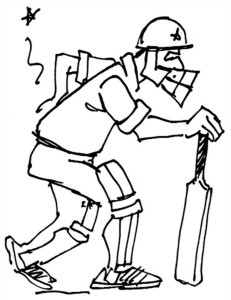
Sir,
In the recently concluded Faysal Bank Twenty20 Cup, Abbottabad Falcons captain and Pakistan batsman Younis Khan was awarded the best batsman honor for his 201 runs. This shows that Younis Khan is in full form and was the best batsmen among the tournament. However, the Mardan-born right-handed batsman was not selected in squad for ICC World T20 cup, which will be held in Bangladesh starting 16th March.
Shoaib Malik has been selected in the squad for reasons best known to the selection committee headed by Azhar Khan. The 32-year-old Shoaib last scored 50-plus runs in ODIs in 2009 against India at Centurion. In the recent T20 Big Bash League in Australia, Malik scored 29 runs at an average of 7.25 in his last 5 innings for Hobart Hurricanes (3, 14, 0, 0, 12 not out). However, Shoaib scored 65 for Sialkot Stallions against Hyderabad Hawks and an unbeaten 49 against Islamabad Leopards.
In comparison to Shoaib Malik record’s Younis Khan should have been selected in T20 squad.
Mubashir Mahmood,
Karachi.
A name to conjure with
Sir,
This is in response to Mr Shamim Saifullah Khan’s letter printed in The Friday Times last week, commending on my article ‘King without a throne’ (TFT Jan 31-February 6 2014). I am proud that one of the ex-principals of my alma mater University Public School Peshawar has read my piece and had a point to share.
The name which I have used for Dr Khansaib comes from Rajmohan Gandhi’s “Ghaffar Khan – The Non-violent Badshah of the Pakhtuns”. I quote verbatim, “Behram Khan [father of Bacha Khan], his tall and beautiful wife, their eldest son Abdul Jabbar, who was eight years older than Abdul Ghaffar, and even seven-year-old Ghaffar would have shaken to pieces by events of 1897, and aroused to fury against the British” (page 37, Penguin Viking Edition).
In an end note about the name Abdul Jabbar, Rajmohan writes: “Or, according to a minority view in the family, Abdul Sattar. The given name was seldom used, however, and he is known to history as Dr Khan Sahib.”
Bacha Khan, in his autobiography, calls his brother Dr Khansaib.
Dr Khansaib was older than Bacha Khan by eight years, as Gandhi puts it.
Hope this will clear the confusion. I agree with the rest of Mr Khan’s points.
Raza Wazir,
Lahore.
Corrigendum
Sir,
The Friday Times published a photograph it its photo archive in its Jan 24 2014 issue, showing what it called a Morris Eight in accident in Multan.
The car is in fact an OPEL Model Super 6, 1937, and the photograph is originally from my brother’s collection on his FLICKR page.
The car was registered to my grandfather, Dr Muhammad Abdul Wahid Khan.
Muhammad Faizullah Khan,
Multan.
Shame

Sir,
This is with reference to the photograph published in national newspapers – a most horrible and unbelievable one – showing a man with a white beard dragging a helpless woman from inside a van by her hair, while a number of silent spectators including innocent children watched it like a show from a movie. Shame on this nation, shame on this society, and shame on our leaders! Pity the nation that raises not its voice!
Pity the nation where a 12-year-old Malala is shot in the head only because she wants to go to school. Pity the nation where young girls are made domestic maids and tortured to death on petty maters. Pity the nation in which clubs carry signs on their entrances saying “maids and pets not allowed”. Pity the nation where girls can only cook, knit and clean the house, and cannot go to school.
Aamir Aqil,
Lahore.
Barbarians at the gate
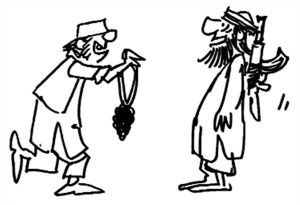
Sir,
The cold blooded barbarity perpetrated by the Taliban, who even flouted the teachings of the Holy Quran and the Sharia by killing 23 FC men that they had captured, should awaken their apologists to the dangers that confront this country from within.
These men were employed by the state to perform legitimate duties and their killing during peace talks suggest that the TTP sees our eagerness to negotiate as a sign of weakness, and not as a desire to settle matters peacefully without shedding any more blood.
If state fails to be seen enforcing its writ to punish those responsible for this barbarity, then it is sending a wrong message to our sons and daughters eager to join the uniformed services. Negotiations were welcome, because military action could also cause collateral damage, but our failure to enforce the writ of the state is the reason behind the deaths of the FC soldiers and the 13 policemen in Karachi. Citizens of Pakistan found guilty of murder are hanged on the order of courts, not spared just because they share a faith or country with us.
No sovereign nation would allow private militias to be armed to the extent that they create a state within a state, collecting taxes through extortion. What purpose do our uniformed security services serve, if our sovereignty is being challenged from within by those elements created by our own follies, delusions, and myopic vision?
If the TTP considers it permissible to kill our men and yet say that they are eager to hold talks, what prevents us from striking with all our firepower to punish specific elements responsible for these recent massacres while also continuing with the talks?
Malik Tariq Ali,
Lahore.

